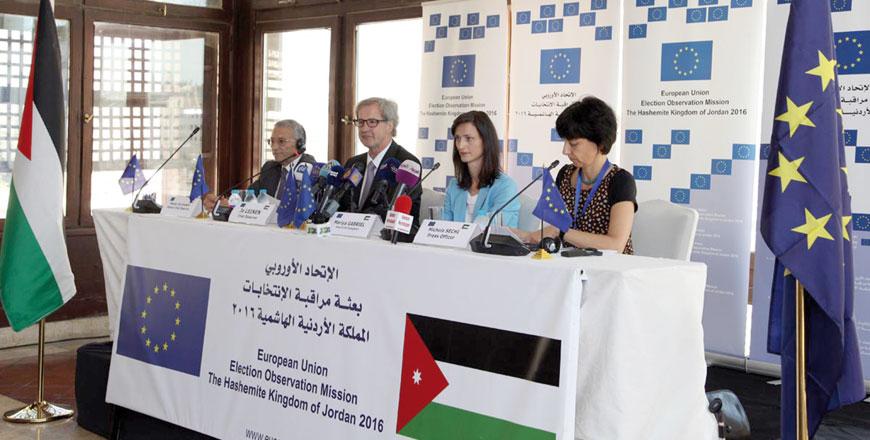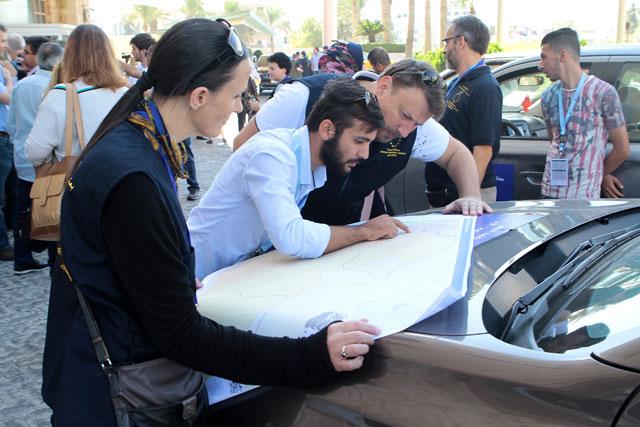You are here
EU observers say elections ‘well-organised’ with room for improvement
By Mohammad Ghazal - Sep 22,2016 - Last updated at Sep 22,2016

Members of the EU Election Observation Mission hold a press conference in Amman on Thursday (Petra photo)
AMMAN — The EU Election Observation Mission (EU EOM) to Jordan on Thursday said the parliamentary elections were well-organised and inclusive, while recommending amendments to the legal framework.
The mission’s chief observer, Jo Leinen, presented the delegation’s preliminary statement on Tuesday’s elections for the 18th Lower House, and said that overall, the electoral campaign was peaceful with “isolated reports of minor campaign-related incidents”.
There was considerable campaigning outside the polling stations on election day, which is not in line with the law, the mission’s statement said, while aspects of the Elections Law could be improved.
“In particular, respect for key principles, such as the universality and equality of the vote, and the right to stand as a candidate could be further enhanced,” Leinen said.
Greater efforts should be exerted to increase the number of female lawmakers and to encourage citizens, particularly young people, to vote, the mission said.
Twenty women will be serving as lawmakers in the 18th Lower House, a record for Jordan, with 15 quota seats and five female candidates winning outside the quota.
Political parties should play a larger role in engaging society and encouraging voter participation, the mission said, while lowering the age of eligibility for candidates could bring more young people to the ballot box.
Mariya Gabriel, head of the European Parliament’s delegation which joined the EU mission, agreed that greater participation of women and young people should be encouraged, as well as “more political debate based on political party programmes”.
However, she congratulated the Jordanian people on a “well-organised and overall peaceful election day”.
Leinen suggested that a new election law could go further in redistributing parliamentary seats across the Kingdom.
“Under the current districting, large urban areas are underrepresented and sparsely populated or rural areas are considerably overrepresented,” he said.
“This districting falls short of ensuring the equality of the vote, although it marks an improvement compared to the districting for the 2013 parliamentary elections,” Leinen added.
According to the EU mission’s preliminary conclusions, candidate registration was conducted in an “inclusive and efficient manner”, although some requirements were “unnecessarily restrictive”.
“Voters and candidates can appeal against inaccurate registrations or rejections, but the absence of a second recourse of appeal left some uncertainty,” Leinen said.
The vote count proceeded peacefully and calmly and voting was generally well organised in 441 out of 459 polling stations visited, according to the observers.
The secrecy of the ballot was respected in most polling stations observed, but full access to the district tabulation was not offered, the mission said.
EU observers reported incidents in several districts including Karak, Madaba, Ajloun, Central Badia and Northern Badia, while the Independent Election Commission (IEC) employed its information technology networks efficiently.
Although no specific restrictions on media coverage were observed, Jordanian media operate in an environment considered “partially free”, the mission said, adding that the current media legal framework is restrictive and at times vague and results in self-censorship.
During the observation period, three gag orders were issued, banning media reports on specific topics and limiting freedom of expression, which is guaranteed under international and national laws.
Journalists made strong efforts to inform voters about the new electoral system and to encourage voter participation, the EU EOM said, although its monitors reported some imbalance in election coverage.
Also on Thursday, Leinen met with Prime Minister Hani Mulki, who stressed that Jordan was keen to hold parliamentary elections with full participation to enhance democracy in the Kingdom, despite the situation in the region.
Mulki said the government provided all forms of support to the IEC, which supervised and administered all stages of the election process, the Jordan News Agency, Petra, reported.
Leinen told the premier that the elections were an important step towards political reform.
The EU mission is expected to issue a comprehensive final report with recommendations within two months.
Related Articles
AMMAN — The EU Election Observation Mission (EU EOM) to Jordan on Sunday deployed 40 short-term observers across the Kingdom ahead of Tuesda
AMMAN — Most polling stations opened on time on Tuesday, but campaign activities were observed at several voting centres, the EU’s Election
AMMAN — The 2016 parliamentary election was in overall "quite good", EU’s Election Observation Mission (EU EOM) to Jordan said.During a pres














